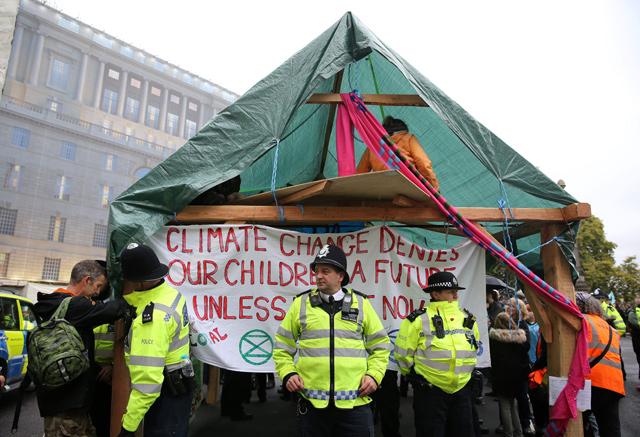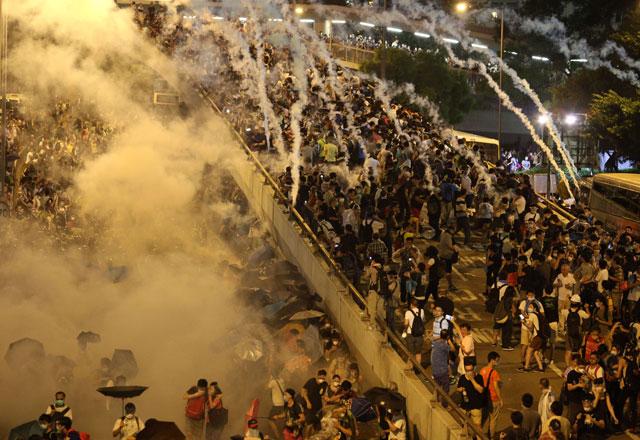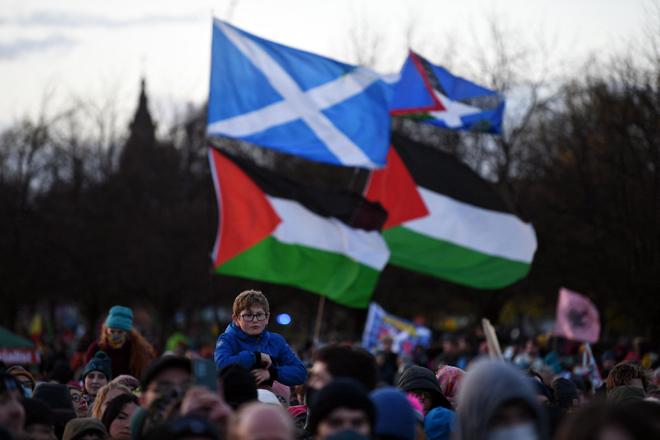You are here
Global climate ‘rebellion’ sees mass arrests and blocked roads
By AFP - Oct 07,2019 - Last updated at Oct 07,2019

British Police officers surround a structure erected by climate change activists from the group Extinction Rebellion, during their demonstration, near Lambeth Bridge in central London, on Monday (AFP photo)
LONDON — Climate protesters from Sydney to London blocked roads on Monday, sparking mass arrests at the start of two weeks of civil disobedience demanding immediate action to save the Earth from "extinction".
Crowds chained themselves to vehicles and other structures and unrolled sleeping bags in the middle of streets in defiance of police across Europe and parts of Asia and Africa.
The year-old group Extinction Rebellion has energised a global movement demanding governments drastically cut the carbon emissions that scientists have shown to cause devastating climate change.
They are backed by Greta Thunberg — the Swedish teenager whose searing UN address in September made international headlines — and by academics studying the rising temperatures and sea levels.
Their protests have irritated drivers and some officials but raised the hopes of those who see climate change as a threat to the planet.
"We do it to highlight the threat of extinction if we don't change our ways," Cape Town pharmacy student Jade Vester told AFP.
Extinction Rebellion member Mike Buick, 40, at an event outside UK Prime Minister Boris Johnson's Downing Street office, said: "I think non-violent civil disobedience is powerful.
"It's a respectful attempt to communicate deeply-held moral beliefs."
Chained to car
Hundreds of Australians joined a sit-in on a busy inner Sydney road before being dragged away by the police. Thirty people were later charged.
"We have tried petitions, lobbying and marches, and now time is running out," Australian activist Jane Morton said.
Australia's conservative government has resisted adopting new environmental standards and backed lucrative coal exports.
There were also protests in India's capital New Delhi. Cities across the giant south Asian country hold the top seven spots on the World Health Organisation's outdoor pollution database.
The epicentre of past actions has been London — the Extinction Rebellion movement's birthplace.
A small group erected a mock nuclear missile outside the defence ministry building and put up other structures on Westminster Bridge in the shadow of Britain's parliament.
Police arrested several protesters there during Monday morning.
"Getting arrested sends a message to the government that otherwise law-abiding citizens are desperate," IT consultant Oshik Romem — from Israel but working in Britain for 19 years — told AFP while sitting on a road outside parliament.
London police said they had made 135 arrests by 12:30 am (11:30 GMT). Most are usually released after being booked and only charged for grave or repeat offences.
Campaigners in Dublin wheeled in a pink yacht and parked outside the office of Irish Prime Minister Leo Varadkar.
Further protests were planned in 60 cities around the world.
"We are running out of time," Dutch protester Shirleen Chin told AFP in Amsterdam.
"In fact, I think we have run out of time in some parts of the world and we are calling out for action."
Dutch police said they had arrested 90 people after Extinction Rebellion members occupied a bridge outside the famed Rijksmuseum art gallery.
Two rallies are planned in the United States — in New York's Battery Park a few blocks from Wall Street and in downtown Chicago — and one in Toronto.
'Burn capitalism!'
The movement is partially credited with pushing the UK government in June to become the first in the Europe Union to commit itself to a net-zero target for harmful emissions by 2050.
Extinction Rebellion is demanding governments reach that target by 2025, as well as holding "citizens assemblies" to decide on policies to achieve that aim.
The parliament in Norway — not an EU member — in June adopted a target of 2030.
There has been less movement in other parts of Europe or the most impacted cities of Asia.
And not everyone out on the streets was impressed with the campaign.
"They're turning people against them," Dave Chandler, driving one of London's famous black cabs, told AFP from a log-jammed Trafalgar Square.
"They're taking it out on everyday people trying to go about their business," he grumbled. "They should go after big people."
Extinction Rebellion counters that emergencies like the one heating up the climate demands action from everyone across the world.
Hundreds barricaded themselves inside a Paris shopping centre for hours over the weekend.
Groups unfurled banners with slogans such as "Burn capitalism, not petrol" above Paris restaurants and fashion boutiques.
And hundreds brought blankets and sleeping bags to one of the main roundabouts in central Berlin which police expect to be shut down for many days.
Shaming and seizure
Extinction Rebellion's tactics in Australia prompted senior conservative politicians to call for protesters' welfare payments to be cut and for public denunciations.
Sydney assistant police commissioner Mick Willing accused protesters of putting themselves and others at risk, warning that such disruptive protests in the future would "not be tolerated".
Related Articles
LONDON — Police in London on Monday warned activists from Extinction Rebellion they faced arrest after the environmental pressure group bloc
Hong Kong police fired volleys of tear gas to disperse pro-democracy protests on Sunday and baton-charged a crowd blocking a key road in the government district in defiance of official warnings against illegal demonstrations.
GLASGOW — Thousands of climate protesters braved torrential rain in Glasgow on Saturday to take part in worldwide demonstrations against wha













